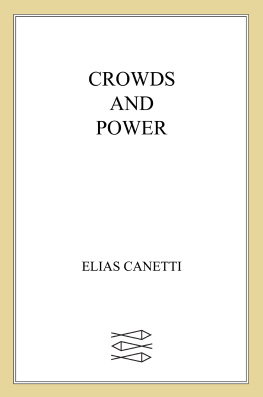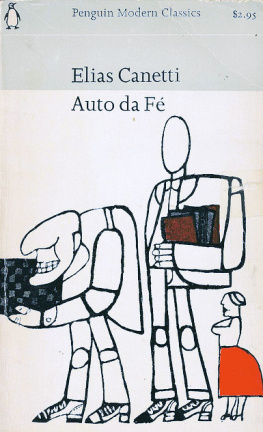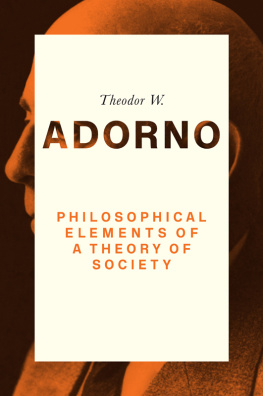Elias Canetti - Crowds and Power
Here you can read online Elias Canetti - Crowds and Power full text of the book (entire story) in english for free. Download pdf and epub, get meaning, cover and reviews about this ebook. year: 2021, publisher: Farrar, Straus and Giroux, genre: Religion. Description of the work, (preface) as well as reviews are available. Best literature library LitArk.com created for fans of good reading and offers a wide selection of genres:
Romance novel
Science fiction
Adventure
Detective
Science
History
Home and family
Prose
Art
Politics
Computer
Non-fiction
Religion
Business
Children
Humor
Choose a favorite category and find really read worthwhile books. Enjoy immersion in the world of imagination, feel the emotions of the characters or learn something new for yourself, make an fascinating discovery.
- Book:Crowds and Power
- Author:
- Publisher:Farrar, Straus and Giroux
- Genre:
- Year:2021
- Rating:3 / 5
- Favourites:Add to favourites
- Your mark:
- 60
- 1
- 2
- 3
- 4
- 5
Crowds and Power: summary, description and annotation
We offer to read an annotation, description, summary or preface (depends on what the author of the book "Crowds and Power" wrote himself). If you haven't found the necessary information about the book — write in the comments, we will try to find it.
Crowds and Power — read online for free the complete book (whole text) full work
Below is the text of the book, divided by pages. System saving the place of the last page read, allows you to conveniently read the book "Crowds and Power" online for free, without having to search again every time where you left off. Put a bookmark, and you can go to the page where you finished reading at any time.
Font size:
Interval:
Bookmark:

CROWDS AND POWER
by
ELIAS CANETTI
Translated from the German by
Carol Stewart
Farrar, Straus and Giroux
New York
The author and publisher have provided this e-book to you for your personal use only. You may not make this e-book publicly available in any way. Copyright infringement is against the law. If you believe the copy of this e-book you are reading infringes on the authors copyright, please notify the publisher at: http://us.macmillanusa.com/piracy.
The author wishes to acknowledge with gratitude the generous support given him in his research by the Bollingen Foundation
The translator wishes to acknowledge very gratefully the help and advice of the author in preparing this text
T HERE IS NOTHING that man fears more than the touch of the unknown. He wants to see what is reaching towards him, and to be able to recognize or at least classify it. Man always tends to avoid physical contact with anything strange. In the dark, the fear of an unexpected touch can mount to panic. Even clothes give insufficient security: it is easy to tear them and pierce through to the naked, smooth, defenceless flesh of the victim.
All the distances which men create round themselves are dictated by this fear. They shut themselves in houses which no-one may enter, and only there feel some measure of security. The fear of burglars is not only the fear of being robbed, but also the fear of a sudden and unexpected clutch out of the darkness.
The repugnance to being touched remains with us when we go about among people; the way we move in a busy street, in restaurants, trains or buses, is governed by it. Even when we are standing next to them and are able to watch and examine them closely, we avoid actual contact if we can. If we do not avoid it, it is because we feel attracted to someone; and then it is we who make the approach.
The promptness with which apology is offered for an unintentional contact, the tension with which it is awaited, our violent and sometimes even physical reaction when it is not forthcoming, the antipathy and hatred we feel for the offender, even when we cannot be certain who it isthe whole knot of shifting and intensely sensitive reactions to an alien touchproves that we are dealing here with a human propensity as deep-seated as it is alert and insidious; something which never leaves a man when he has once established the boundaries of his personality. Even in sleep, when he is far more unguarded, he can all too easily be disturbed by a touch.
It is only in a crowd that man can become free of this fear of being touched. That is the only situation in which the fear changes into its opposite. The crowd he needs is the dense crowd, in which body is pressed to body; a crowd, too, whose psychical constitution is also dense, or compact, so that he no longer notices who it is that presses against him. As soon as a man has surrendered himself to the crowd, he ceases to fear its touch. Ideally, all are equal there; no distinctions count, not even that of sex. The man pressed against him is the same as himself. He feels him as he feels himself. Suddenly it is as though everything were happening in one and the same body. This is perhaps one of the reasons why a crowd seeks to close in on itself: it wants to rid each individual as completely as possible of the fear of being touched. The more fiercely people press together, the more certain they feel that they do not fear each other. This reversal of the fear of being touched belongs to the nature of crowds. The feeling of relief is most striking where the density of the crowd is greatest.
T HE CROWD , suddenly there where there was nothing before, is a mysterious and universal phenomenon. A few people may have been standing togetherfive, ten or twelve, not more; nothing has been announced, nothing is expected. Suddenly everywhere is black with people and more come streaming from all sides as though streets had only one direction. Most of them do not know what has happened and, if questioned, have no answer; but they hurry to be there where most other people are. There is a determination in their movement which is quite different from the expression of ordinary curiosity. It seems as though the movement of some of them transmits itself to the others. But that is not all; they have a goal which is there before they can find words for it. This goal is the blackest spot where most people are gathered.
This is the extreme form of the spontaneous crowd and much more will have to be said about it later. In its innermost core it is not quite as spontaneous as it appears, but, except for these 5, 10 or 12 people with whom actually it originates, it is everywhere spontaneous. As soon as it exists at all, it wants to consist of more people: the urge to grow is the first and supreme attribute of the crowd. It wants to seize everyone within reach; anything shaped like a human being can join it. The natural crowd is the open crowd; there are no limits whatever to its growth; it does not recognize houses, doors or locks and those who shut themselves in are suspect. Open is to be understood here in the fullest sense of the word; it means open everywhere and in any direction. The open crowd exists so long as it grows; it disintegrates as soon as it stops growing.
For just as suddenly as it originates, the crowd disintegrates. In its spontaneous form it is a sensitive thing. The openness which enables it to grow is, at the same time, its danger. A foreboding of threatening disintegration is always alive in the crowd. It seeks, through rapid increase, to avoid this for as long as it can; it absorbs everyone, and, because it does, must ultimately fall to pieces.
In contrast to the open crowd which can grow indefinitely and which is of universal interest because it may spring up anywhere, there is the closed crowd.
The closed crowd renounces growth and puts the stress on permanence. The first thing to be noticed about it is that it has a boundary. It establishes itself by accepting its limitation. It creates a space for itself which it will fill. This space can be compared to a vessel into which liquid is being poured and whose capacity is known. The entrances to this space are limited in number, and only these entrances can be used; the boundary is respected whether it consists of stone, of solid wall, or of some special act of acceptance, or entrance fee. Once the space is completely filled, no one else is allowed in. Even if there is an overflow, the important thing is always the dense crowd in the closed room; those standing outside do not really belong.
The boundary prevents disorderly increase, but it also makes it more difficult for the crowd to disperse and so postpones its dissolution. In this way the crowd sacrifices its chance of growth, but gains in staying power. It is protected from outside influences which could become hostile and dangerous and it sets its hope on repetition. It is the expectation of reassembly which enables its members to accept each dispersal. The building is waiting for them; it exists for their sake and, so long as it is there, they will be able to meet in the same manner. The space is theirs, even during the ebb, and in its emptiness it reminds them of the flood.
T HE MOST IMPORTANT occurrence within the crowd is the discharge. Before this the crowd does not actually exist; it is the discharge which creates it. This is the moment when all who belong to the crowd get rid of their differences and feel equal.
Font size:
Interval:
Bookmark:
Similar books «Crowds and Power»
Look at similar books to Crowds and Power. We have selected literature similar in name and meaning in the hope of providing readers with more options to find new, interesting, not yet read works.
Discussion, reviews of the book Crowds and Power and just readers' own opinions. Leave your comments, write what you think about the work, its meaning or the main characters. Specify what exactly you liked and what you didn't like, and why you think so.








